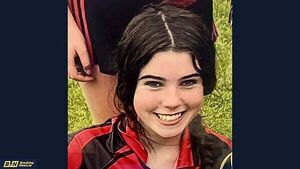Teenager (14) died from brain damage caused by inhaling content aerosol deodorant, inquest hears

Séan McCárthaigh
A Co Clare teenager suffered fatal brain damage after inhaling the contents of an aerosol deodorant that her mother had bought just hours earlier, an inquest has heard.
The tragic circumstances of the death of Sarah Mescall, 14, from Cloongowna, Kilnamona, Co Clare at Children’s Health Ireland in Crumlin on September 25th, 2023, were heard at a sitting of Dublin District Coroner’s Court on Monday.
The inquest heard the 2nd year student at Coláiste Muire in Ennis, Co Clare died from irreversible brain damage five days after she became unwell at her family home after sniffing the contents of the deodorant.
It was also noted by the pathologist who conducted the postmortem, Michael McDermott, that there is a long association between the inhalation of “volatile substances,” such as those containing deodorants, and sudden, unexpected deaths.
At the time of Sarah’s death, it was reported that gardaí were investigating if the fatal incident was linked to a viral challenge on social media.
However, no reference was made at the inquest to any possible role played by online content in her death.
Sarah's mother, Deirdre Mescall, gave evidence of collecting her daughter from the school bus at a local crossroads at 4.45pm on September 20th, 2023.
Ms Mescall recalled that Sarah had gone to her bedroom as normal after having a dinner of a pizza that she made with her younger sister.
She said her daughter would have been on her phone, but was also preparing to go to the National Ploughing Championships the following day.
Ms Mescall said she went upstairs at 5.45pm to bring her other daughter to camogie training when she saw Sarah swaying by the window in her own bedroom.
The inquest heard that Sarah appeared drunk when she turned around in response to her mother asking her if she was OK.
Ms Mescall recalled: “I said ‘Sarah what did you do?’ And she answered: ‘Nothing.’”
The witness said she started to panic before her daughter informed her that she had inhaled the contents of a female aerosol deodorant that Ms Mescall said she had bought in a supermarket earlier that day.
Ms Mescall said Sarah collapsed onto her husband, Joe, when he arrived in the bedroom after she had called out to him for help.
She said there was no response when they threw water on their daughter’s face, and Ms Mescall said she also checked for a pulse but could find none.
Ms Mescall said she started CPR on her daughter while her husband called for an ambulance.
The inquest heard that Sarah was transported by helicopter to University Hospital Limerick and later transferred to Children’s Health Ireland at Temple Street in Dublin by ambulance.
A decision was subsequently taken on September 22nd, 2023 to transfer her to CHI at Crumlin for specialist cardiac care.
Ms Mescall said she only later discovered that her younger daughter, who was aged 7 at the time, had seen Sarah put her head under her school jumper that evening and inhale the deodorant.
The inquest heard that Sarah had been a fit and healthy teenager who loved camogie.
In reply to questions from coroner Cróna Gallagher, Ms Mescall, who wept openly during the proceedings, said no one had come to her afterwards to say that kids had been experimenting with such substances.
Her husband gave evidence that his eldest daughter had been in great form earlier that day.
However, Mr Mescall said he knew Sarah was unwell after he prevented her from falling to the ground.
“Her colour was not good,” he said.
Mr Mescall described how the couple were assisted by two neighbours, Brid Hegarty and Carmel McInerney, who were also nurses while they were waiting for emergency services to arrive.
“Sarah got every chance, but it didn’t work out,” he said.
Mr Mescall said doctors told them at UHL that Sarah’s condition was serious, but added: “We had hoped she would make some sort of recovery.”
The inquest heard doctors at UHL had diagnosed Sarah as having suffered a lack of oxygen to the brain before a decision was taken to transfer her to hospital in Dublin.
A report from a consultant in emergency medicine, Suzanne Crowe, recorded that Sarah had suffered a devastating hypoxic brain injury, which subsequently led to brain stem death.
Dr Crowe said inhaling substances could also cause heart problems, which is why a decision was taken to transfer her to CHI at Crumlin.
While the condition of Sarah’s heart improved, the coroner observed that the brain injury she had suffered was irreversible.
The inquest heard a postmortem had confirmed she had died from a lack of oxygen to the brain and damage to her heart muscle from a cardiac arrest due to the inhalation of a deodorant.
Recording a verdict of death by misadventure, Dr Gallagher explained it was to reflect that she died as the result of an unintended consequence of an action that had a risk factor.
The coroner acknowledged that Sarah may not have known that what she was doing was risky, as teenagers have a different perception of risk to adults.
Dr Gallagher said it was unknown if it was the first time that the teenager had inhaled such a substance, but there was no evidence it was “an ongoing, regular issue.”
She added: “We obviously don’t know what made her do it other than I suppose all young people experiment.”
Offering her condolences to Sarah’s parents, the coroner said she could not imagine how difficult the days were while their daughter was sick, particularly as they had some hope at the beginning that she would recover.
Dr Gallagher also praised their courage and generosity in deciding to donate their daughter’s organs to help other children.
If you have been affected by any of the issues raised in this article, you can freephone the Samaritans 24 hours a day for confidential support at 116 123 or email jo@samaritans.org.
You can also freephone the national Bereavement Support Line run by the HSE and Irish Hospice Foundation at 1800-80 70 77 (Monday-Friday 10am-1pm), and the contact information for a range of mental health supports is available at mentalhealthireland.ie/get-support/.
In the case of an emergency, or if you or someone you know is at risk of suicide or self-harm, dial 999/112.




